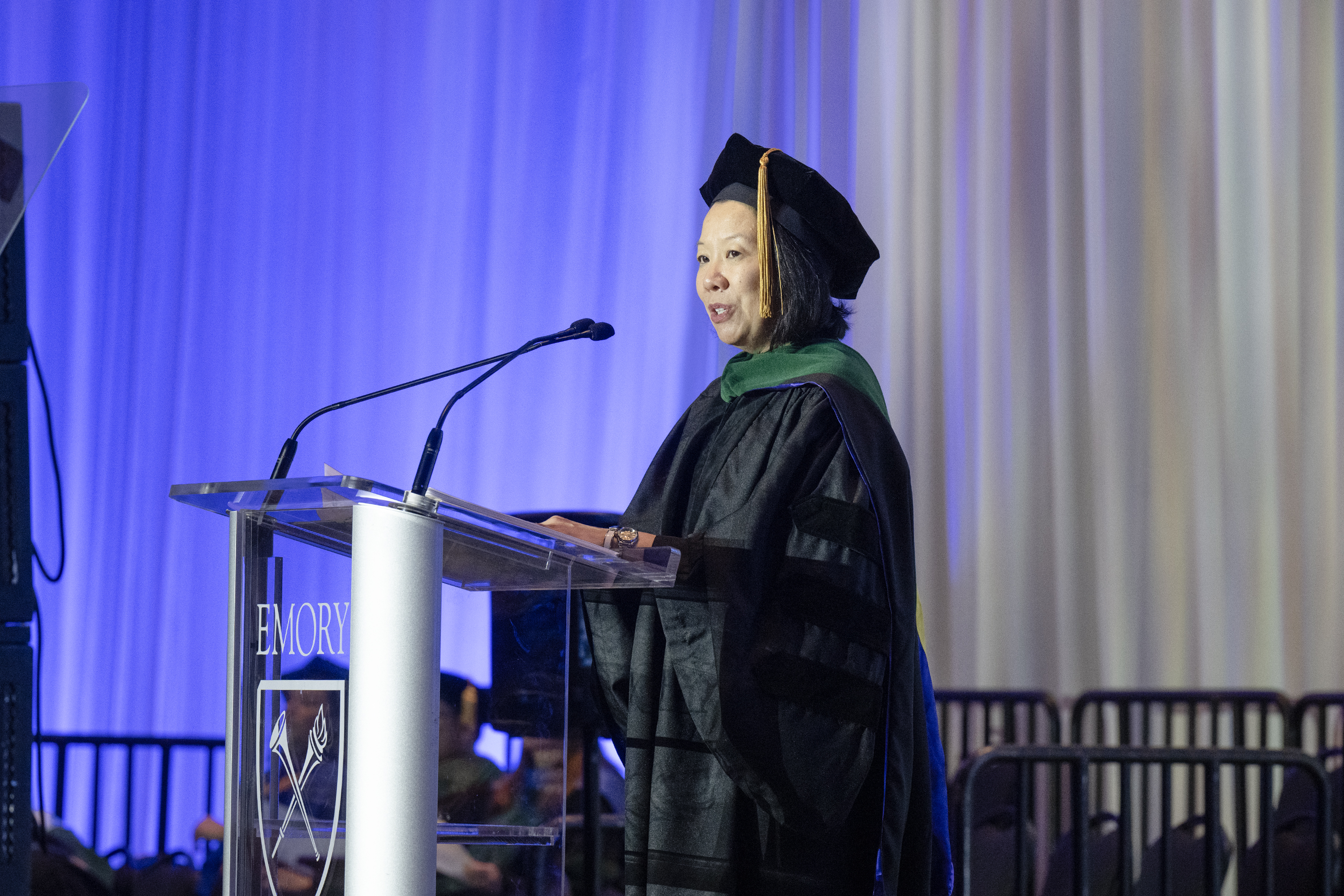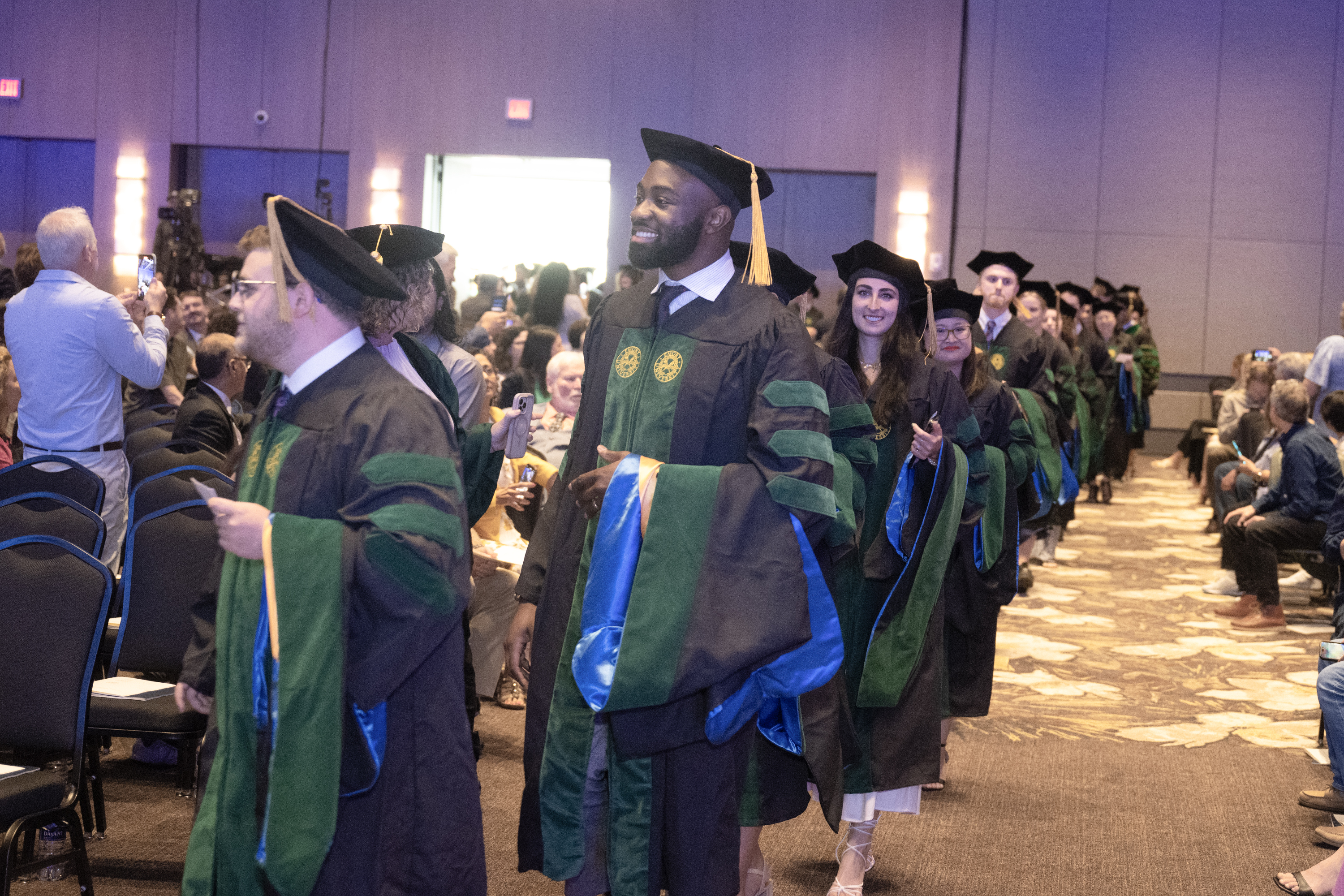
A bagpiper led the Emory School of Medicine MD Program 2024 graduates down the aisle, many smiling broadly and waving to relatives, on the morning of Friday, May 10, at the Gas South Convention Center ballroom.
Also held on Friday was the Doctor of Physical Therapy Program graduation; on Saturday, May 11, the Genetic Counseling Training Program graduation, and on Monday, May 13, the Medical Imaging Program graduation, all at the Gas South Convention Center.
The new dean of the School of Medicine, Sandra Wong, opened the ceremony, introducing Pastor Ruy Mizuki, pastor at Chatsworth West United Methodist Church in Los Angeles and parent of medical graduate John Mizuki, who led the invocation. “We thank you [God] for calling these graduates into a life dedicated to the service and physical, emotional, and psychological well-being of others,” Mizuki said.
“We are all here to celebrate the accomplishments of this tremendous group of individuals who collectively represent the bright future of the medical profession,” said Dean Wong. “Graduation is not just an ending, it’s really a start … this career is about lifelong learning. Learn from your patients, learn from your peers."
“We all learn when things go right, those events are pretty reinforcing, but also remember to learn when things don’t go exactly as expected. We learn how to do better the next time. I encourage all of you to stay curious, that’s how growth and discovery really work. Our patients deserve that. So embrace new knowledge and innovation that stem from wanting things to be better. … I am so excited to see how all of you will change people’s lives, how you will make a difference for your patients and your communities.”
Former Interim Dean Carlos del Rio introduced commencement speaker Victor Dzau, the president of the National Academy of Medicine and vice chair of the National Research Council, by saying his “research laid the foundation for lifesaving medication that I, and probably many of you, take: ACE inhibitors for the treatment of high blood pressure or congestive heart failure.”
Dzau is the Chancellor Emeritus and James B. Duke Distinguished Professor of Medicine at Duke University and the past president and CEO of the Duke University Health System.
“I want to acknowledge that for you, medical school has been anything but typical. You were the first COVID class, beginning your journey in the thick of the pandemic,” said Dzau. “Of course, 2020 also had polarization, misinformation, and mistrust.” He also spoke of the Russian invasion of the Ukraine, the Israel-Gaza conflict, and the subsequent protests on university campuses, including Emory, as “shaping who you are.”
“As you embark on your careers, you carry your unique perspectives with you. Your hard-won life experience has prepared you in ways that academic training alone really can’t. Although you encounter inevitable setbacks and failures over your career, it’s how you respond to them that really matters.”
One of his earliest memories, Dzau recalls fleeing Shanghai to Hong Kong at five years old as a refugee after civil war in China. “We left in the dead of night, abandoning our familiar circumstances, our friends, and our life. We didn’t get to say goodbye to our loved ones. … We bought few belongings, and our new home was a single room without a kitchen or toilet.” Resources were scarce and illness was rampant. “Those times were tough and deeply influenced my perspective on the world and inspired me to become a physician,” he said.
Health equity, he said, cannot be achieved without addressing issues of economic equity, public policy, and social justice. “So I ask you as trusted professionals to stand up and speak out when you see injustice and disparities,” he said. “Graduates, you can see the world really needs your help. Remember, you have the power to effect meaningful transformations.”
Faculty and student awards were presented after Dzau’s address:
- The Provost’s Distinguished Teaching Award for Excellence in Graduate and Professional Education was presented to Adriana Hermida, director of geriatric psychiatry and of geriatric psychiatry fellowships in the Department of Psychiatry and Behavioral Sciences.
- The Evangeline Papageorge Distinguished Teaching Award was presented to Dimitri Cassimatis, associate professor in the Department of Medicine’s Division of Cardiology.
- The Marion Luther Brittain Award, considered the highest honor for an Emory student, was presented to Alan Amedi.
Next, members of the Emory School of Medicine Corpus Cordis Aureum, or Golden Corps of the Heart, were recognized. This year’s group included alumni from the year 1974 and earlier.
After the hooding of PhD recipients and recognition of dual degree recipients, the hooding of the MD recipients took place. The class then recited the Oath of Hippocrates, as is tradition.
Class speaker Ashley Harriott, president of the School of Medicine’s MD Class of 2024, “We met virtually at Zoom university,” she says. “… But, we pressed on, navigating virtual learning, adapting to changing guidelines, and forming community… the first time we all came together in person was over a year into our time at Emory.”
“We have been a class of many firsts and many transitions,” Harriott says. “But somehow we did it. The class of 2024 knows change well, and it has made us resilient. We are a class that has learned to dream bigger, ask more questions, and step up to the plate when called upon. We are physicians now who can handle curve balls and are not afraid to face adversity head on.”
“Our patients will benefit because our class is one with resiliency and strength baked into it, and we know we can handle whatever comes our way.”


